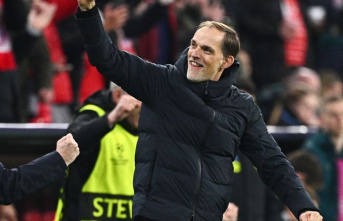above our heads is in the process of playing a game of chess is invisible, but whose consequences are huge. The 18 march and 22 April 2020, two rockets of SpaceX, owned by billionaire Elon Musk, have each launched into orbit sixty satellites. These launches are the sixth and seventh of a series designed to be easily and quickly 1,584 satellites, and a new launch is planned in may.
The goal is to build a network of satellites, named "the link of the stars" (Starlink), which is able to ensure that all Earthlings (solvent) broadband access to the Internet. In 2025, Starlink should have 11 943 satellites to fully cover the planet, with a purpose subsequent of 42 000 if he gets permission. These numbers are huge compare to some 8 000 satellites that humanity has already put in orbit since the first Sputnik soviet, 2 of which 218 are still operational.
light Pollution and traffic jam in orbit
Shots to the support, the professional astronomers have already strongly protested against the light pollution : across the sky, the satellites Starlink leave long streaks on the astronomical images, to the point of making them unusable. In his speech on march 9 in the conference Satellite 2020, Elon Musk sweeps away these concerns, saying it was convinced that its satellites will have no impact on astronomical discoveries, and, if necessary, their surface will be painted black. The test is done on the satellite 1130 "DarkSat" is hardly convincing.
Read also The train of satellites, SpaceX has worried astronomers
The other satellite operators are also concerned. The region of low earth orbit, already used by satellites to remote sensing, telecommunications and scientific, but also by the international space station, will clearly be bottled. The likely increase in collisions in space and the propagation of the debris that will result from it, could make it unusable in the low orbits and the space environment near. The first incident has already taken place : September 2, 2019, the european space Agency has had to maneuver one of its observation satellites of the Earth to avoid a potential collision with a gear of Starlink. Elon Musk responds that all of its satellites are equipped with thrusters able to make it back to Earth at the end of life.
Read also According to Elon Musk, its constellation of satellites do not have to worry about astronomers
Waste in space-waste on Earth
other disadvantages are more difficult to correct, and without a doubt even more serious. Since the first launch, the six satellites are already out of service. If only a tenth of the satellites of Starlink were to fail during their operational life, estimated between 5 and 7 years, this would add many thousands of space debris to the 20,000 that are already the subject of a surveillance. Operators private space does not apply hardly up to the standards required operators to state, since no obligation imposed upon them to evacuate themselves, their satellites down, or to finance common missions to do. This situation is strangely reminiscent of what happens with the pollution of soil and water...
Just as catastrophic, is the putting in place of infrastructure disproportionate, involving a predation of resources and energy on our planet, both to build the satellite and for the launch, control them or use them. Unlike the geostationary satellites are commonly used in telecommunications, satellites Starlink orbit the earth at low altitude. They cross the sky visible at a given location in just a few minutes. To follow up, each user will have to buy a special antenna (called the control phase). These antennas on the ground will have to be mass-produced to make their prices affordable. SpaceX has already asked for permission to install a million... for a start. In addition, SpaceX plans to install the connections between its network Starlink, and the main interconnection points in the Internet network.
fleets of satellites and private competition
Worse still, the competition sharpens its weapons : the americans Kuiper promoted by Amazon, and OneWeb billionaire Greg Wyler, or the chinese Hongyan. As for scooters, electric, several manufacturers are embarking on a massive production, disastrous from the point of view of ecological as well as economic. The aim is to be the first to occupy the field to take part, in particular to capture the market of connected objects. Elon Musk has forced the pace to have a shot to advance, but it is not the only one, and multiple redundant systems may soon turn above our heads ! There will be at most one winner... and maybe even none at all.
On 9 march 2020, Elon Musk has announced that, thanks to Starlink, " customers will be able to watch high definition movies, play video games and do anything they want ". Showing explicitly its willingness to strengthen digital business already massively polluting (video streaming, video conferencing, online video games), the phrase from Elon Musk that ends in a meaningful way : my clients will be able to do everything they want, like me I do what I want. Elon Musk seems to be taking ownership of the space, with the permission of the Federal Communications Commission, the agency charged with regulating the telecommunications and networks in the United States and that they decided to repeal the rules of net neutrality.
also Read Tesla : Elon Musk, the man who was worth $ 100 billion
Thus, the american authority responsible for regulating the communications of his country allow a company to make what looks like a privatization of the space occupying mass low earth orbits while accounting for resources useful to the entire planet – even as the area was declared a common good of humanity by the outer space treaty of 1967.
*Roland Lehoucq is a researcher in astrophysics, atomic energy commission and alternative energies (CEA);
**François Graner is director of research, University of Paris.
Date Of Update: 22 May 2020, 11:33










